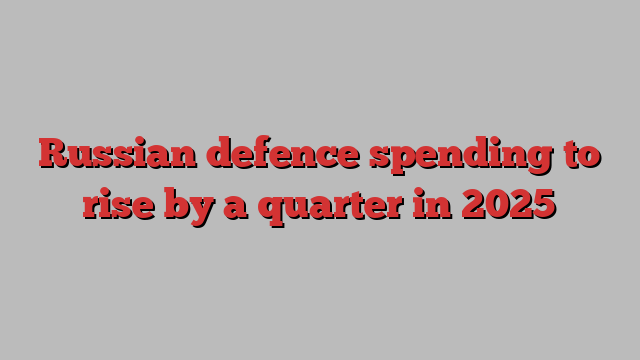
Unlock the Editor’s Digest for free
Roula Khalaf, Editor of the FT, selects her favourite stories in this weekly newsletter.
Russia plans to raise its spending on defence by a quarter in 2025, underscoring President Vladimir Putin’s determination to continue his invasion of Ukraine and intensify confrontation with the west.
The finance ministry has earmarked a record Rbs13.5tn ($145bn) for next year, according to draft budget documents published on Monday, compared to this year’s figure of Rbs10.8tn.
The 2025 budget indicates Putin has decided to double down on the “military Keynesianism” that has helped supply the front in Ukraine with weapons, fuelled a consumer spending boom, and left officials to warn of rising inflation and labour shortages.
“The bureaucrats last year had to pretend that the ‘special operation’ will be over swiftly, which is clearly no longer the case. The pretence is off now,” said Elina Ribakova, a senior fellow at the Peterson Institute for International Economics.
“The gloves are off. They don’t feel they need to pretend any more that there could be a return to normalcy anytime soon.”
Despite widespread expectations in western capitals and Moscow that sanctions would cripple Russia’s economy, gross domestic product grew by 3.6 per cent last year and is forecast at around the same levels for 2024.
The rise in military spending smashes the record Russia set last year and comes despite expectations the wartime splurge would be a one-off. Defence spending is expected to fall slightly to Rbs12.8tn in 2026 and Rbs13.1tn a year later.
Other spending on “security”, of about Rbs3.5tn on average over the next three years, means Russia’s total expenditures in the sector are even higher, taking total spending on defence and security to about 40 per cent of the budget.
The finance ministry offered almost no explanation for the rise, saying only that “significant funds have been earmarked to ensure the tasks [of the invasion] are achieved”. It said the resources, whose details are largely classified from public view, would go to arming the military, paying salaries, and supporting the defence sector.
Anton Siluanov, finance minister, portrayed the budget as primarily aimed at social support, following a series of one-off payments and edicts Putin made to ordinary Russians ahead of his election to a fifth term in March.
But social spending is set to fall from Rbs7.7tn this year to Rbs6.5tn next, outstripped by the defence sector for a third year running.
“Putin is spending on the military like he doesn’t care — it is not an election year,” Ribakova said.
Siluanov said on state television that “Russia is lessening its dependency on oil and gas revenue,” which the budget projects to shrink from Rbs11.3tn this year to Rbs9.8tn by 2027.
“This is good,” he said, adding that the break-even oil price for Russia was set at $60 per barrel — the cap set by G7 nations in an attempt to limit the Kremlin’s ability to fund the war through its energy revenues.
Russia frequently finds ways to sell oil at prices above the cap. Siluanov said the Kremlin expected its oil and gas revenues to sink to 27 per cent this year as domestic production increased.